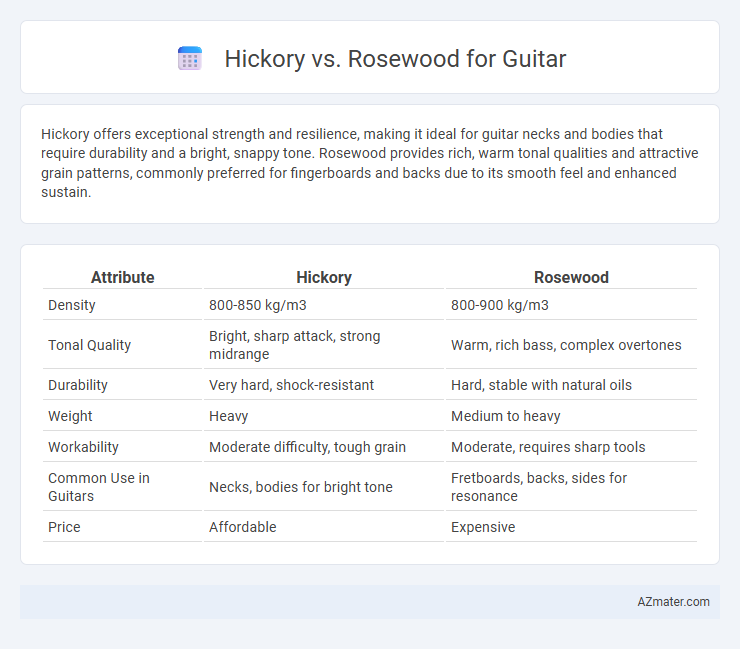Hickory offers exceptional strength and resilience, making it ideal for guitar necks and bodies that require durability and a bright, snappy tone. Rosewood provides rich, warm tonal qualities and attractive grain patterns, commonly preferred for fingerboards and backs due to its smooth feel and enhanced sustain.
Table of Comparison
| Attribute | Hickory | Rosewood |
|---|---|---|
| Density | 800-850 kg/m3 | 800-900 kg/m3 |
| Tonal Quality | Bright, sharp attack, strong midrange | Warm, rich bass, complex overtones |
| Durability | Very hard, shock-resistant | Hard, stable with natural oils |
| Weight | Heavy | Medium to heavy |
| Workability | Moderate difficulty, tough grain | Moderate, requires sharp tools |
| Common Use in Guitars | Necks, bodies for bright tone | Fretboards, backs, sides for resonance |
| Price | Affordable | Expensive |
Introduction: Understanding Hickory and Rosewood in Guitar Making
Hickory offers exceptional strength and durability, making it a preferred choice for guitar necks and bodies that require resilience and stability. Rosewood, known for its rich tonal qualities and smooth grain, is commonly used for fingerboards and backs, enhancing the instrument's sound warmth and sustain. Understanding the unique properties of Hickory and Rosewood helps guitar makers select the right wood to balance playability, tone, and longevity.
Overview of Hickory and Rosewood Tonewoods
Hickory offers a bright, snappy tone with strong midrange presence and excellent durability, making it ideal for solid-body electric guitars that require aggressive attack and clear note definition. Rosewood is prized for its rich, warm sound characterized by deep bass response and smooth highs, commonly used for fingerboards and backs in acoustic guitars due to its dense, oily texture that enhances sustain. Both tonewoods contribute unique tonal qualities, with Hickory providing clarity and punch, while Rosewood delivers warmth and resonance.
Physical Properties: Density and Hardness Comparison
Hickory guitar wood typically has a density ranging from 0.72 to 0.85 g/cm3, offering a balance of strength and moderate hardness with a Janka rating around 1,820 lbf. Rosewood, notably denser and harder, ranges from 0.80 to 1.05 g/cm3 in density and boasts a Janka hardness of approximately 2,440 lbf, providing superior durability and a richer tonal resonance. These physical property differences influence the guitar's weight, sustain, and tonal warmth, with rosewood favored for its dense, hard characteristics that enhance sound clarity and projection.
Tone and Sound Characteristics: Hickory vs Rosewood
Hickory guitar bodies produce a bright, punchy tone with strong midrange emphasis and excellent note definition, making them ideal for genres requiring clear attack and articulation. In contrast, rosewood offers warm, rich, and resonant sound characteristics with deep bass response and complex overtones, favored for its smooth sustain and balanced tonal spectrum. The dense grain structure of rosewood contributes to its harmonic richness, while hickory's slightly softer nature enhances its dynamic responsiveness and crispness.
Playability and Feel: User Experience Differences
Hickory guitars offer a dense and sturdy feel, providing a solid grip that enhances control and precision, ideal for players who prefer a firm tactile response. Rosewood guitars deliver a smoother, warmer touch with natural oils that contribute to a comfortable, polished surface, appealing to those seeking softness and ease in playability. User experience varies as hickory's robustness supports aggressive strumming, while rosewood's refined texture facilitates fluid fingerstyle techniques.
Durability and Maintenance Considerations
Hickory offers exceptional durability and resistance to wear, making it ideal for guitar necks subjected to heavy use, while rosewood requires more careful maintenance due to its porous nature and sensitivity to humidity changes. Rosewood's natural oils help repel moisture, but regular conditioning with specialized oils is necessary to prevent drying and cracking, unlike hickory which is less prone to environmental damage. Choosing between the two depends on balancing the need for robust, low-maintenance material with the desire for rosewood's tonal warmth and aesthetic appeal.
Aesthetic Appeal: Grain, Color, and Finish
Hickory guitars showcase a bold, rustic grain pattern with a light to medium brown hue, often featuring contrasting sapwood that enhances their visual interest. Rosewood exhibits a rich, dark brown to deep reddish color with intricate, swirling grain patterns that provide a luxurious and elegant finish. The natural oils in rosewood contribute to a smooth, glossy surface that contrasts with hickory's more matte, textured appearance, making each wood choice distinct in aesthetic appeal.
Price and Availability of Hickory and Rosewood
Hickory is generally more affordable and widely available than rosewood, making it a popular choice for guitar bodies and necks. Rosewood, known for its rich tonal qualities, is often pricier due to its limited supply and strict regulations on harvesting. The high demand and restricted availability of rosewood contribute to its premium price compared to the more accessible and cost-effective hickory.
Environmental Impact and Sustainability
Hickory and rosewood differ significantly in environmental impact and sustainability, with hickory sourced primarily from North American forests managed under sustainable forestry practices, offering a more eco-friendly alternative. Rosewood, particularly Brazilian rosewood, is listed under CITES due to overharvesting and habitat loss, making it less sustainable and subject to strict trade regulations. Guitar manufacturers increasingly favor reclaimed or alternative woods like hickory to reduce ecological harm and support responsible resource use.
Which is Better for Your Guitar: Hickory or Rosewood?
Hickory offers exceptional strength and durability, making it ideal for guitar backs and sides that require resistance to impact and wear, while rosewood is prized for its rich tonal qualities, providing warm bass, bright trebles, and excellent sustain. Rosewood's dense, oily grain enhances resonance and projection, favored in acoustic guitars for superior sound quality, whereas hickory's heavier weight may affect playability but contributes to a balanced tone with strong midrange presence. Choosing between hickory and rosewood ultimately depends on your preference for durability and tonal character, with rosewood excelling in musical expressiveness and hickory in toughness and longevity.

Infographic: Hickory vs Rosewood for Guitar
 azmater.com
azmater.com